Solar eclipse of April 16, 1893
| Solar eclipse of April 16, 1893 | |
|---|---|
 Map | |
| Type of eclipse | |
| Nature | Total |
| Gamma | -0.1764 |
| Magnitude | 1.0556 |
| Maximum eclipse | |
| Duration | 287 sec (4 m 47 s) |
| Coordinates | 1°18′N 34°36′W / 1.3°N 34.6°W |
| Max. width of band | 186 km (116 mi) |
| Times (UTC) | |
| Greatest eclipse | 14:36:11 |
| References | |
| Saros | 127 (51 of 82) |
| Catalog # (SE5000) | 9264 |
A total solar eclipse occurred on April 16, 1893. A solar eclipse occurs when the Moon passes between Earth and the Sun, thereby totally or partly obscuring the image of the Sun for a viewer on Earth. A total solar eclipse occurs when the Moon's apparent diameter is larger than the Sun's, blocking all direct sunlight, turning day into darkness. Totality occurs in a narrow path across Earth's surface, with the partial solar eclipse visible over a surrounding region thousands of kilometres wide.
Observations[]
Schaeberle observed the eclipse and made drawings of the Corona:
 Predicted by Schaeberle |
 Observed by Schaeberle |
 Observed by Schaeberle |
According to Edward S. Holden, John Martin Schaeberle discovered a comet like object on the plates of the eclipse from Chile. The comet was 0.8 moondiameters from the moon.[1]
Related eclipses[]
Saros 127[]
It is a part of Saros cycle 127, repeating every 18 years, 11 days, containing 82 events. The series started with partial solar eclipse on October 10, 991 AD. It contains total eclipses from May 14, 1352 through August 15, 2091. There are no annular eclipses in this series. The series ends at member 82 as a partial eclipse on March 21, 2452. The longest duration of totality was 5 minutes, 40 seconds on August 30, 1532. All eclipses in this series occurs at the Moon’s ascending node.[2]
| Series members 52–68 occur between 1901 and 2200 | ||
|---|---|---|
| 52 | 53 | 54 |
 April 28, 1911 |
 May 9, 1929 |
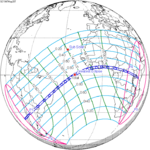 May 20, 1947 |
| 55 | 56 | 57 |
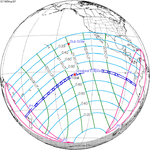 May 30, 1965 |
 June 11, 1983 |
 June 21, 2001 |
| 58 | 59 | 60 |
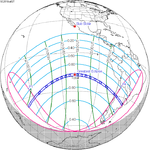 July 2, 2019 |
 July 13, 2037 |
 July 24, 2055 |
| 61 | 62 | 63 |
 August 3, 2073 |
 August 15, 2091 |
August 26, 2109 (Partial) |
| 64 | 65 | 66 |
| September 6, 2127 (Partial | September 16, 2145 (Partial) | September 28, 2163 (Partial) |
| 67 | 68 | |
| October 8, 2181 (Partial) | October 19, 2199 (Partial) | |
Tritos series[]
This eclipse is a part of a tritos cycle, repeating at alternating nodes every 135 synodic months (≈ 3986.63 days, or 11 years minus 1 month). Their appearance and longitude are irregular due to a lack of synchronization with the anomalistic month (period of perigee), but groupings of 3 tritos cycles (≈ 33 years minus 3 months) come close (≈ 434.044 anomalistic months), so eclipses are similar in these groupings.
| Series members between 1801 and 2100 | |||
|---|---|---|---|
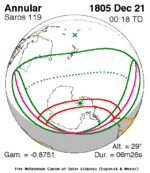 December 21, 1805 (Saros 119) |
 November 19, 1816 (Saros 120) |
 October 20, 1827 (Saros 121) | |
 September 18, 1838 (Saros 122) |
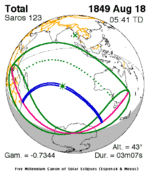 August 18, 1849 (Saros 123) |
 July 18, 1860 (Saros 124) | |
 June 18, 1871 (Saros 125) |
 May 17, 1882 (Saros 126) |
 April 16, 1893 (Saros 127) | |
 March 17, 1904 (Saros 128) |
 February 14, 1915 (Saros 129) |
 January 14, 1926 (Saros 130) | |
 December 13, 1936 (Saros 131) |
 November 12, 1947 (Saros 132) |
 October 12, 1958 (Saros 133) | |
 September 11, 1969 (Saros 134) |
 August 10, 1980 (Saros 135) |
 July 11, 1991 (Saros 136) | |
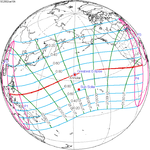 June 10, 2002 (Saros 137) |
 May 10, 2013 (Saros 138) |
 April 8, 2024 (Saros 139) | |
 March 9, 2035 (Saros 140) |
 February 5, 2046 (Saros 141) |
 January 5, 2057 (Saros 142) | |
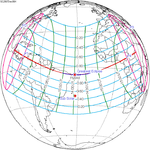 December 6, 2067 (Saros 143) |
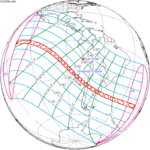 November 4, 2078 (Saros 144) |
 October 4, 2089 (Saros 145) | |
 September 4, 2100 (Saros 146) |
|||
In the 22nd century:
- Solar saros 147: annular solar eclipse of August 4, 2111
- Solar saros 148: total solar eclipse of July 4, 2122
- Solar saros 149: total solar eclipse of June 3, 2133
- Solar saros 150: annular solar eclipse of May 3, 2144
- Solar saros 151: annular solar eclipse of April 2, 2155
- Solar saros 152: total solar eclipse of March 2, 2166
- Solar saros 153: annular solar eclipse of January 29, 2177
- Solar saros 154: annular solar eclipse of December 29, 2187
- Solar saros 155: total solar eclipse of November 28, 2198
In the 23rd century:
- Solar saros 156: annular solar eclipse of October 29, 2209
- Solar saros 157: annular solar eclipse of September 27, 2220
- Solar saros 158: total solar eclipse of August 28, 2231
- Solar saros 159: partial solar eclipse of July 28, 2242
- Solar saros 160: partial solar eclipse of June 26, 2253
- Solar saros 161: partial solar eclipse of May 26, 2264
- Solar saros 162: partial solar eclipse of April 26, 2275
- Solar saros 163: partial solar eclipse of March 25, 2286
- Solar saros 164: partial solar eclipse of February 22, 2297
Notes[]
- ^ SENL200304 (PDF) at NASA.gov
- ^ "Solar Saros series 127". NASA Goddard Space Flight Center. NASA. Retrieved 2 November 2017.
References[]
- NASA graphics
- Fotos of Solar Corona April 16, 1893
- [1],[2], [3] Eclipse of April 16, 1893. Contact print from the original glass plate negative.] Lick Observatory Plate Archive, Mt. Hamilton.
- Mabel Loomis Todd (1900). Total Eclipses of the Sun. Little, Brown.
| Wikimedia Commons has media related to Solar eclipse of 1893 April 16. |
- Total solar eclipses
- 1893 in science
- 19th-century solar eclipses
- April 1893 events


